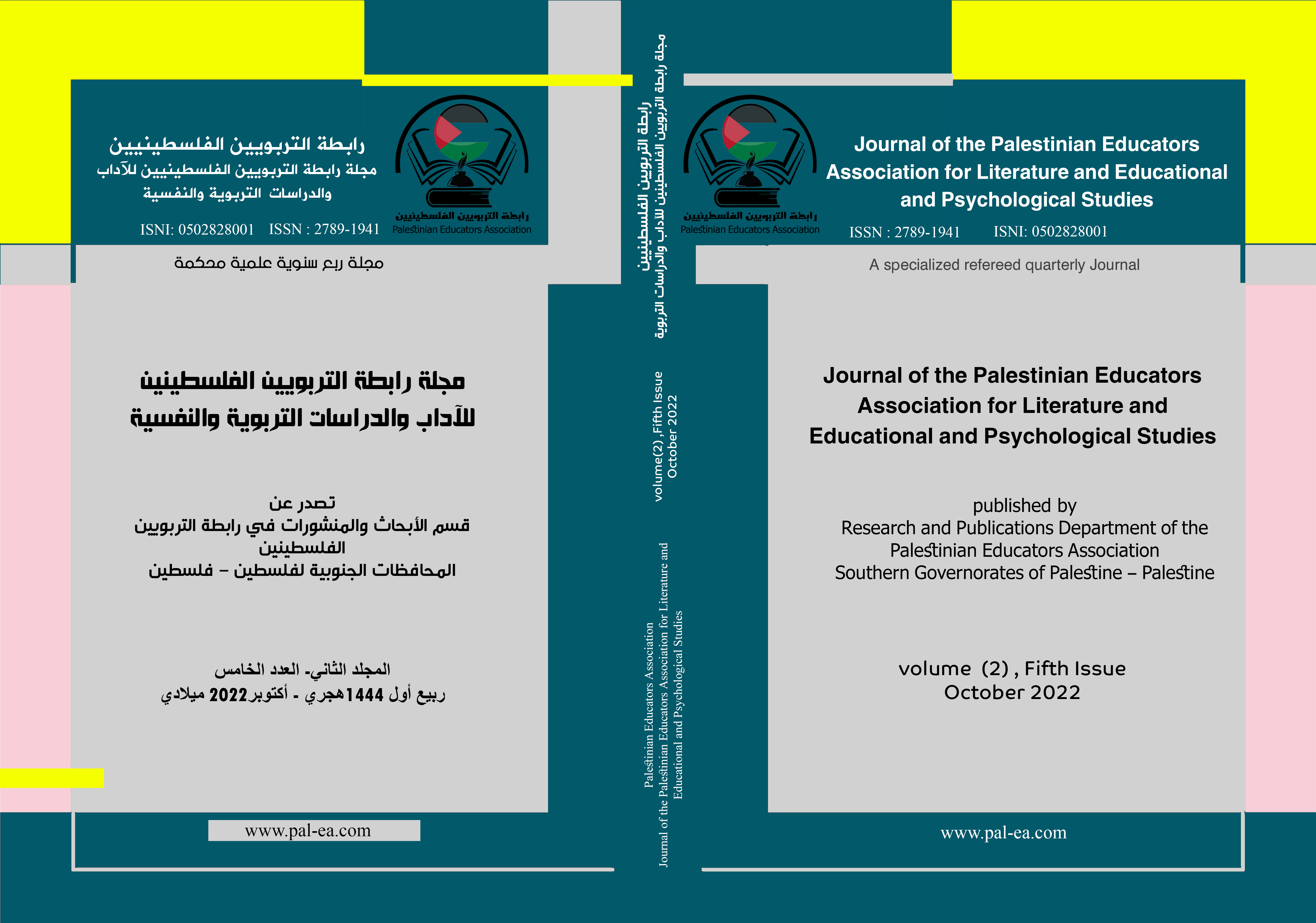Developing the professional competencies of the teaching staff at Al-Iman Private School through designing an electronic platform - the school window to the Palestinian and Arab world -
DOI:
https://doi.org/10.69867/PEAJ050Keywords:
Professional competencies, electronic platform - the school windowAbstract
This study aims to develop the professional competencies of the faculty members at Al-Iman Private School by designing an electronic platform called “The School Window for the Palestinian and Arab World.” The sample represented faculty members at the school, where the study curriculum was applied comprehensively, including design and application of the electronic platform and evaluation of its impact. The study highlighted important results, including improving teaching skills, increasing interaction between faculty members, and improving the quality of available educational resources. In addition, the study showed the importance of integrating technology into the education process and achieving communication with Palestinian and Arab educational resources. The study concluded that the use of the electronic platform can be of great benefit in developing the professional competencies of faculty members, and provides recommendations to strengthen and expand these initiatives in the future, such as enhancing training and ongoing support for teachers on the use of technology in education and expanding the range of available digital educational resources.
Downloads
References
References
● [1] Khin Khin Thant Sin. (2022). Teacher learning and professional development in school-university partnership: How do mentors learn?. https://akjournals.com/view/journals/063/13/1/article-p121.xml
● [2] Iman Nuwayhid, Ghida Krisht, Samer Jabbour, Jocelyn DeJong, Huda Zurayk. (2021). Mapping University-Based Master of Public Health Programs in the Arab world. https://www.ncbi.nlm.nih.gov/pmc/articles/PMC8300585/
● [3] Ambreen Mohammad, Carey Borkoski. (2024). Organizational conditions and teacher turnover in private schools of United Arab Emirates. https://www.sciencedirect.com/science/article/pii/S2590291123004060
● [4] Al-Iman School. (2024). https://www.alimanschool.ca/about/about-the-school
● [5] Simon F. Quattlebaum. (2015). Designing Professional Development for Elementary School Teachers. https://scholarworks.waldenu.edu/cgi/viewcontent.cgi?referer=&httpsredir=1&article=2548&context=dissertations
● [6] Sirojuddin Arif, Rezanti Putri Pramana, Niken Rarasati, Destina Wahyu Winarti. (2022). Nurturing Learning Culture among Teachers: Demand-Driven Teacher Professional Development and the Development of Teacher Learning Culture in Jakarta, Indonesia. https://rise.smeru.or.id/sites/default/files/publication/Nurturing%20Learning%20Culture%20among%20Teachers%20Indonesia.pdf
● [7] Eva L. Jones. (2017). UNDERSTANDING DIVERSITY IN SUBURBAN SCHOOL DISTRICTS: THE IMPACT OF CULTURALLY PROFICIENT PROFESSIONAL DEVELOPMENT AND SCHOOL LEADERSHIP. https://library3.sage.edu/archive/thesis/ED_2017jones.pdf
● [8] Mohammad Abdu Allah AL Alhazmi, Ebtsam Sultan Abdul Hameed Ahmed. (2022). A Proposed Perception To Developing The Professional Competencies Of Early Childhood Teachers In The Light Of The 21st Century Skills. https://journalppw.com/index.php/jpsp/article/download/8690/5674/10027
● [9] Jo Shan Fu. (2013). Microsoft Word - 8-EDICT-2012-1541-CE.docx. https://files.eric.ed.gov/fulltext/EJ1182651.pdf
● [10] Opal Davis, Madga ElKadi Saleh, Leila Shatara, Sufia Azmat, Habeeb Qadri, Salah Ayari, Iman Hashem, Azra Ali, Dalia El-Deeb, Munir Shaikh, Omar Ezzeldine, Jihad Turk, Heba Abdo, Akela Smalls, Jelena Naim, Safia Arif, Nuzhat Hye, Ghazala Basharat, Mohammed Sadiq Moniza Hasan Sabria Mills Abeer Saleh Tamara Gray. (2016). 18th ANNUAL ISNA EDUCATION FORUM. https://www.isna.net/wp-content/uploads/2016/10/Presentations-EF-2017.pdf
● [11] Hamed Mubarak Al-Awidi, Iman Mohammad Alghazo. (2012). The effect of student teaching experience on preservice elementary teachers' self-efficacy beliefs for technology integration in the UAE. https://www.researchgate.net/publication/257682552_The_effect_of_student_teaching_experience_on_preservice_elementary_teachers'_self-efficacy_beliefs_for_technology_integration_in_the_UAE
● [12] Rashid Abdul Salam, Susan Labadi. (2031). 14th Annual ISNA Education Forum March 28-31, 2013. https://www.isna.net/wp-content/uploads/2016/10/2013_education_forum_presentations.pdf
● [13] Al-Iman School Reviews. (2024). https://www.niche.com/k12/al-iman-school-jamaica-ny/reviews/
● [14] Khalil Al-Jammal. Norma Ghamrawi. (2013). Teacher professional development in Lebanese schools. https://www.researchgate.net/publication/287996741_Teacher_professional_development_in_Lebanese_schools
● [15] Anies Al-Hroub. (2023). Evaluating gifted education in Palestine: A study of educational and learning capitals. https://www.tandfonline.com/doi/full/10.1080/2331186X.2023.2240931
● [16] Education Drivers. (2024). https://www.winginstitute.org/teacher-retention-turnover
● [17] Barnett Berry, Kevin C. Bastian, Linda Darling-Hammond, Tara Kini. (2021). The Importance of Teaching and Learning Conditions. https://learningpolicyinstitute.org/product/leandro-teaching-and-learning-conditions-brief
● [18] Nils Kirsten, Jannika Lindvall, Andreas Ryve, Jan-Eric Gustafsson. (2023). How effective is the professional development in which teachers typically participate? Quasi-experimental analyses of effects on student achievement based on TIMSS 2003-2019. https://www.sciencedirect.com/science/article/pii/S0742051X23002305
Published
Issue
Section
License

This work is licensed under a Creative Commons Attribution-NonCommercial-ShareAlike 4.0 International License.
The Journal of the Palestinian Educators Association for Literature, Educational and Psychological Studies
E-issn: 2789-1941
Authors retain Copyright
The Journal of the Palestinian Educators Association for Literature, Educational and Psychological Studies allows Authors retain Copyright and grant the journal right of first publication with the work simultaneously licensed under a Creative Commons Attribution (CC-BY) 4.0 License that allows others to share the work with an acknowledgment of the work’s authorship and initial publication in this journal.
Provided they are the owners of the Copyright to their work, authors are able to enter into separate, additional contractual arrangements for the non-exclusive distribution of the journal’s published version of the work (e.g., post it to an institutional repository, in a journal or publish it in a book), with an acknowledgment of its initial publication in this journal.
Authors are permitted and encouraged to post their work online (e.g., in institutional repositories, disciplinary repositories, or on their website) prior to
and during the submission process.










